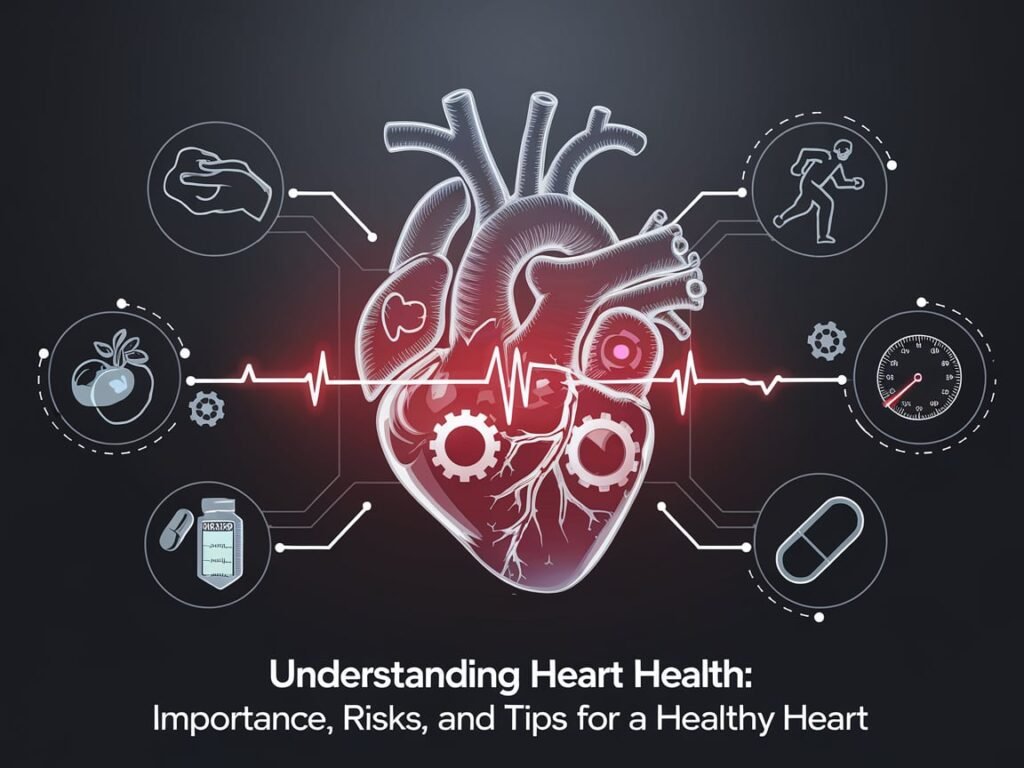Introduction
Heart health is an essential aspect of overall well-being that impacts every facet of our lives. The heart is a vital organ responsible for pumping blood throughout the body, delivering oxygen and nutrients to tissues and removing waste products. Maintaining good heart health is crucial to living a long, active life, as cardiovascular diseases are among the leading causes of death globally. This article explores the significance of heart health, the risks associated with poor cardiovascular fitness, and practical tips to ensure a healthy heart.
The Importance of Heart Health
- Quality of Life: A healthy heart allows individuals to engage in daily activities without fatigue. When the heart functions optimally, physical exertion, whether exercising, playing with children, or performing household chores, becomes manageable and enjoyable.
- Prevention of Chronic Diseases: Heart health is interconnected with other chronic conditions such as diabetes, obesity, and hypertension. A strong cardiovascular system helps prevent these diseases, leading to better overall health outcomes.
- Mental Well-being: Studies show a strong link between heart health and mental health. Individuals with cardiovascular diseases often experience anxiety and depression. Conversely, maintaining a healthy heart can improve mood and mental clarity.
- Longevity: Heart disease is a significant factor in mortality rates. By prioritizing heart health, individuals can significantly reduce their risk of heart disease and enhance their longevity.
Risks to Heart Health
Understanding the risks that threaten heart health is crucial for prevention and early intervention. Some of the most common risk factors include:
- Unhealthy Diet: Consuming a diet high in saturated fats, trans fats, sodium, and sugar can lead to the buildup of plaque in the arteries, increasing the risk of heart disease.
- Physical Inactivity: Sedentary lifestyles contribute to weight gain, high blood pressure, and elevated cholesterol levels, all of which can adversely affect heart health.
- Smoking: Tobacco smoke contains harmful chemicals that damage blood vessels and heart tissue, significantly increasing the risk of heart disease.
- Excessive Alcohol Consumption: While moderate alcohol consumption may have some heart benefits, excessive drinking can lead to high blood pressure, cardiomyopathy, and other heart-related issues.
- Obesity: Excess body weight can strain the heart and lead to various conditions, including hypertension, diabetes, and high cholesterol, all of which are risk factors for heart disease.
- Chronic Stress: Long-term stress may contribute to heart disease by causing harmful changes in the body, including increased blood pressure and heart rate.
- Genetics: A family history of heart disease can increase an individual’s risk, making it essential to monitor heart health closely.
Signs and Symptoms of Heart Problems
Being aware of the signs and symptoms of heart problems can lead to early detection and treatment. Common symptoms include:
- Chest Pain or Discomfort: Often described as a feeling of pressure, squeezing, fullness, or pain, chest discomfort can be a sign of a heart attack.
- Shortness of Breath: Difficulty breathing or feeling winded during regular activities can indicate heart issues.
- Fatigue: Unexplained fatigue, especially after exertion, can be a warning sign, particularly in women.
- Irregular Heartbeats: Palpitations or a racing heart can be symptoms of an underlying heart condition.
- Swelling in the Legs or Feet: Fluid retention in the legs or feet may signal heart failure or other heart-related issues.
Tips for Maintaining a Healthy Heart
- Adopt a Heart-Healthy Diet:
- Focus on Fruits and Vegetables: Aim for a variety of colorful fruits and vegetables daily to ensure a wide range of nutrients.
- Choose Whole Grains: Opt for whole-grain bread, pasta, and rice instead of refined grains to increase fiber intake.
- Limit Unhealthy Fats: Reduce saturated and trans fats by choosing lean proteins, low-fat dairy products, and healthy fats like olive oil and avocados.
- Watch Your Sodium Intake: Aim for less than 2,300 mg of sodium per day. Use herbs and spices to flavor your food instead of salt.
- Exercise Regularly:
- Aim for at least 150 minutes of moderate-intensity aerobic exercise each week, such as brisk walking, cycling, or swimming. Additionally, incorporate strength training exercises at least twice a week.
- Maintain a Healthy Weight:
- A healthy body weight reduces the risk of heart disease. Focus on gradual weight loss through a balanced diet and regular exercise if overweight.
- Quit Smoking:
- If you smoke, seek support to quit. The benefits of quitting smoking can be seen almost immediately, improving heart health and reducing risks.
- Limit Alcohol Consumption:
- If you drink alcohol, do so in moderation. For women, this means up to one drink per day; for men, up to two drinks per day.
- Manage Stress:
- Incorporate stress-reducing activities into your routine, such as yoga, meditation, or deep breathing exercises. Regular physical activity also helps manage stress.
- Regular Health Check-ups:
- Schedule regular check-ups with your healthcare provider to monitor blood pressure, cholesterol levels, and other heart health indicators. Early detection of issues can lead to better outcomes.
- Stay Informed:
- Educate yourself about heart health through reliable resources, health professionals, and community programs. Being informed empowers you to make better choices.
Conclusion
Prioritizing heart health is essential for overall well-being, longevity, and quality of life. By understanding the importance of heart health, recognizing risk factors, and adopting lifestyle changes, individuals can significantly reduce their risk of cardiovascular diseases. A heart-healthy diet, regular exercise, and proactive health management are crucial steps in maintaining a strong and healthy heart. Remember, it’s never too late to start making positive changes for your heart health. Your heart will thank you for it!

